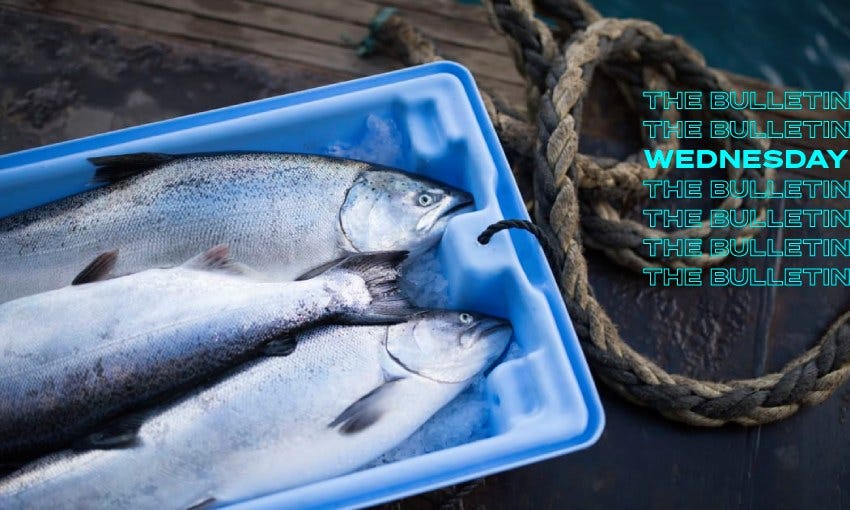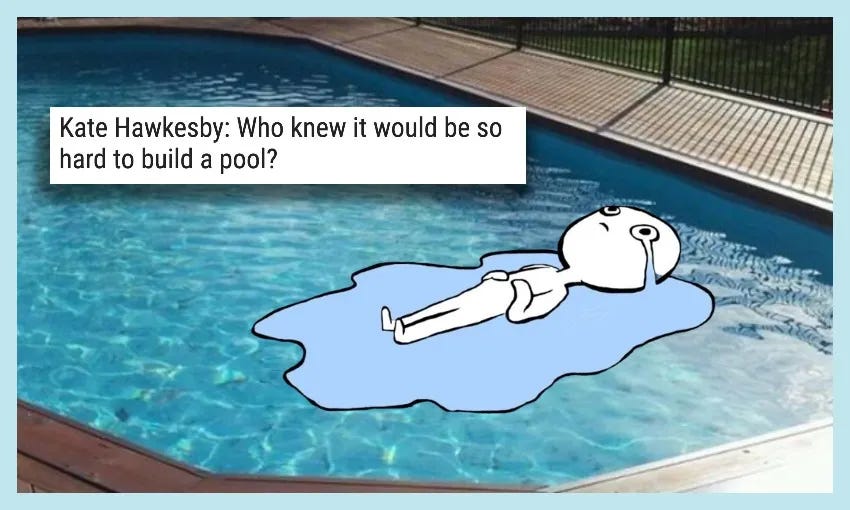Why did 1,300 tonnes of salmon die?
A marine heatwave killed 1,300 tonnes of salmon at a Marlborough Sounds farm and it’s raising questions about how our aquaculture industry adapts to climate change.
Mōrena and welcome to The Bulletin for Wednesday, July 6, by Anna Rawhiti-Connell. Presented in partnership with Z Energy.
In today’s edition: urgent overhaul needed for Wellington’s hospitals; more people getting into debt to pay for essentials; copyright extension prompts split opinions; but first, the impact of climate change on our fisheries industry.
New Zealand King Salmon sent 1,300 tonnes of dead salmon to landfill (Photo RNZ/Supplied)
Marine heat wave kills fish
As RNZ’s Hamish Cardwell writes, a marine heatwave has lifted ocean temperatures five degrees above normal in parts of the country. Salmon don’t thrive in warmer marine temperatures and, in the wild, will seek out cooler waters. That’s not possible in a farmed environment and in Marlborough the country's largest salmon exporter, New Zealand King Salmon, sent 1,300 tonnes of dead salmon to landfill, laid off staff and closed farms after the heat wave killed the fish. For those that imagine fish as items in a supermarket trolley, that’s 1,300,000kg of salmon or roughly 6,500,000 of the 200g packets of salmon that currently sell for $17.49 at New World.
Questions about how multimillion dollar aquaculture industry adapts to climate change
For those that think in business metrics, New Zealand King Salmon has posted a $73m loss, as reported by Newsroom’s Marc Daalder. According to figure.nz the value of aquaculture exports in 2021 totalled over $424m. Both Cardwell’s and Daalder’s stories are extensive and worth a read. Once again, I am exposing my “master of none” naivete, but that scale of loss, both in terms of fish and value, seems quite extraordinary. Both pieces highlight the extent to which climate change and the resulting marine heat waves are prompting questions and concerns about how New Zealand’s aquaculture industry adapts to it. The heat wave also caused mass bleaching of native sea sponges in Fiordland. It should be noted that concerns were raised by an animal welfare group about farmed fish after the salmon died. New Zealand King Salmon responded at the time.
Open sea aquaculture a possible solution but delayed by RMA consent process
Fish has the potential to be a more sustainable and climate-friendly source of in-demand protein both here and abroad. The industry is keen to look at open ocean aquaculture which, as Daalder writes, could unlock a new scale of fish farming while also boosting climate resilience. New Zealand King Salmon applied for resource consent to do just that in 2019 but was met with opposition and Covid-related delays. Chief executive Grant Rosewarne says a bespoke piece of legislation, rather than the lengthy Resource Management Act process, would’ve likely saved the salmon and their business.
Last summer’s marine heat wave is unlikely to be the last
The newly-agreed-to free trade agreement with the European Union has been celebrated by the fisheries industry, as highlighted by various industry press releases and this article in Fish Farmer Magazine (a new read for me). It represents tariff savings of $19.6m per annum and, as Cardwell writes, the government sees the aquaculture industry as a good bet for producing low emissions protein with international market potential. Scientists say last summer’s marine heat wave is unlikely to be the last. Andrea Vance recently published an overview of the mish mash of legislation that governs our marine environments. Experts say a lot of it is out of date – both in terms of protection of our marine environment and in dealing with the threat degradation poses to the commercial value extracted from it. As Cardwell writes, “aquaculture is a climate change canary” and this story about salmon seems very emblematic of the challenges and balancing act we face.
Coming soon from The Spinoff, in partnership with Electric Kiwi, is Future Proof: a new weekly newsletter turning an honest (but optimistic) eye on the environment. Written by award-winning science journalist Ellen Rykers, Future Proof is designed to keep you informed, empowered and inspired about our natural world, the challenges it faces and importantly, the solutions to these challenges. Sign up here to get Future Proof delivered to your inbox every week from July 13.
Urgent overhaul required for Wellingon’s hospitals
RNZ is leading its news bulletin this morning with a story about the state of Wellington’s hospitals. Newly released papers from the now disestablished Capital and Coast and Hutt Valley DHBs, reveal that earthquake risks and escalating health demands have prompted a rush to get plans moving on a region-wide overhaul of hospital facilities by 2035. The plan aims to rapidly relocate the emergency department and many other services by early 2024 and is roughly costed at $1.5b-$2b. Many of the buildings, emergency systems and telecommunications are suffering from a lack of maintenance. One report says "lack of capacity to meet demand and increasing patient complexity is causing delayed care and patient harm". The new health agency, Health NZ Te Whatu Ora told RNZ that: "Due to the complexities of the services involved we are still in the process of finalising the indicative business case”.
Debt being incurred on essentials, buy-now-pay-later schemes causing concern
Consumer NZ told Breakfast yesterday morning that 28% of people with personal debt say they're incurring most of it on essential expenses. This is a 5% "creep" from last year. The organisation also found one in five people have a buy-now-pay-later (BNPL) account and one in four of them are putting those purchases on a credit card. BNPL services are currently unregulated in New Zealand. The government is reviewing whether it needs to regulate them and Consumer NZ has been calling for regulation under the Credit Contracts and Consumer Finance Act (CCCFA). In data released by Centrix in June, 8.9% of BNPL users are in arrears –the highest amount in three years. It served as a a good reminder to share this story with you from SFGATE in the US about the connection between social media influencers, BNPL schemes and large amounts of related debt, particularly among generation Z consumers.
Brand new documentary goes inside the whimsical world of Lynley Dodd
When Lynley Dodd doodled a rhyme about a scrappy dog on the back of a shopping list, she didn’t know she was creating one of our most iconic children’s characters. Now, nearly 40 years since the first Hairy Maclary book was published, the celebrated author invites audiences into her whimsical world for the very first time.
What inspired her decades of cats in boxes, dogs up trees and the elephants in attics? How does the creative process work when one is both the illustrator and writer of their work? And what project is she working on next at the age of 81? The one-off documentary special Lynley Dodd: Writing the Pictures, Painting the Words arrives on The Spinoff today, made with the support of NZ On Air.
Copyright change prompted by EU/NZ free trade agreement splits opinion
As Newroom’s Sam Sachdeva reports, the copyright extension agreed to via the free trade agreement with the UK is being fast-tracked after the announcement of the free trade agreement with the European Union. The library and archival sector says it’s unwelcome news. The sector is warning that the lengthening of our copyright term, from 50 years after a creator’s death to 70 years, would make it harder for New Zealanders to access and use copyrighted works while also damaging library digitisation projects. On the flipside, the change has been welcomed by the recording industry. In a press release from Recorded Music NZ, CEO Jo Oliver says the change puts New Zealand artists and right holders on a level playing field with their overseas counterparts.
Click and collect
I’m introducing something new for The Bulletin today. Click and collect is a quick round-up of stories that are noteworthy and newsworthy but in shorter form. It gives you the opportunity to find greater depth and breadth each morning and it gives me the ability to draw your attention to more, without extensively lengthening The Bulletin. I welcome feedback and thank my colleagues for the suggestions for the section’s name.
Cause for alarm as most of the country is now without a fire truck with a high ladder.
Big news out of the UK this morning. The Chancellor of the Exchequer, Sajid Javid and health secretary, Rishi Sunak have resigned from Boris Johnson’s government amid yet another scandal.
The Herald’s Georgina Campbell details the Infrastructure Commission’s concerns about Wellington’s preferred transport plan and carbon targets.
Newsroom Pro’s Jono Milne looks at tobacco companies exploiting a loophole to avoid excise tax.
Stats NZ figures show New Zealanders are improving at speaking Te Reo and are more supportive of it being taught more widely.
Got some feedback about The Bulletin, or anything in the news? Get in touch with me at thebulletin@thespinoff.co.nz
How do Aotearoa’s Covid regulations compare to the most up-to-date science? Shanti Mathias asks the experts. Gregor Thompson finds out how Geoff Ross's controversial sheep station is helping a UK startup “reinvent knitwear”. Toby Manhire writes about the latest crisis to hit New Zealand, exposed by Kate Hawkesby this week: the cost-of-putting-a-new-pool-in crisis. Chris Schulz weighs up buying an electric car now vs waiting a couple of years for them to get better and/or cheaper. Stewart Sowman-Lund searches in vain for the viral masked baby spotted on an Air NZ flight.
NZ Cricket to pay men and women the same
As Stuff’’s Zoë George reports, New Zealand Cricket have closed the pay equity gap for women’s cricketers. Men and women will receive the same pay for the same work, on the same day. Highest-ranked White Ferns can receive up to $163,246 a year (up from $83,432), the ninth-ranked, $148,946 ($66,266), and the 17th-ranked $142,346 ($62,833). Writing in her newsletter, Alice Soper questions the five year term of the agreement. Soper says it may actually prevent us from fully capturing the potential of the sport given the pace of change in the women’s game and the need to lift performance to compete against international rivals.
Truth or fiction?
Wild midweek read for you about stretching the bounds of truth, or potentially completely lying, as a writer. Writers often use their real life experiences as the basis for fiction writing but this two-parter from Vanity Fair, details how a writer on Grey’s Anatomy has been accused of lying about her own battle with cancer, which was then used in a long-running storyline on the show.












I reckon the Click and Collect is a brilliant idea, but please try and avoid paywalled pieces, will you? I was so keen to read a piece in the New Yorker that I asked about their free trial. They have since I undated my Inbox to the extent that I've had to block them! I certainly can't afford a subscription.
I loved - as always, Toby's piece. I wonder if it ever occurred to Ms Hawkesby to give her surplus money to charity rather than building a swimming pool that, apparently, she doesn't expect to use. I hope part of the resource consent for these luxury projects includes an assessment of, and the need to mitigate, the emissions.
Why are we not taking note of what Canada is doing re Salmon farming? They are rejecting sea fish farming as a cause of pollution, poor quality fish and cruel to the fish because the temperatures cannot be controlled. They are turning to and encouraging fish farming on land. See the detailed report by https://hakaimagazine.com/ people.